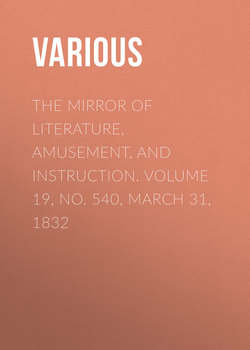Читать книгу The Mirror of Literature, Amusement, and Instruction. Volume 19, No. 540, March 31, 1832 - Various - Страница 2
BANKSIDE.—OLD THEATRES
LACONICS
Оглавление(For the Mirror.)
Amongst men of the world comfort merely signifies a great consideration for themselves, and a perfect indifference about others.
Every one who gives way to thought, must, of necessity, become wiser every day; for either the ideas that present themselves to his mind will confirm his yet rickety theories, or observation will teach him that his previous views of things were ill-founded.
Party spirit is like gambling—a vast number of persons trouble themselves about what in the end can be beneficial only to a few.
It is as difficult to win over an enthusiast by force of reasoning, as to persuade a lover of his mistress's faults; or to convince a man who is at law of the badness of his cause.
Knowledge of the world is regarded as an useful, if not an elegant, accomplishment, but this advantage, like every other good, is mixed with some alloy: the acute observer of men and manners cannot but be disgusted with the scenes that take place around him, and his knowledge may at last have the effect of souring his own disposition.
Talents, without the accompaniment of religion, are but fatal presents: they not only add strength to the vices of the individual, but what is worse they render them more conspicuous to the world.
It is strange that the eye of man should have that magic power we have all felt that it possesses. We can contemplate other bright and beautiful objects without withdrawing our gaze; and what is there in the formation of an eye that should create in us any uneasiness? It is the consciousness that the eye is the index of the mind—that when a man fixes his eye on us we are the subject of his thoughts, and that a being gifted with a soul like ourselves is employing its energies and setting its machinery at work about ourselves. It is this conviction that makes us modestly, and almost involuntarily, shrink from such an inspection.
To put ourselves in a passion, in consequence of the misconduct of others, is unquestionably very weak behaviour, but it has also something generous about it; for we are clearly annoying and punishing ourselves, when the offenders only ought to have been the sufferers.
Meanness and conceit are frequently combined in the same character: for he who to obtain transient applause can be indifferent to truth and his own dignity, will be as little scrupulous about them if, by subserviency, he can improve his condition in the world.
The most trivial circumstances are able to put an end to our gratifications; they are like beds of roses, where it is very unlikely all the leaves should be smooth, and even one that is doubled suffices to make us uncomfortable.
Garrulous men are commonly conceited, and they will be found (with very few exceptions) to be superficial as well. They who are in a hurry to tell what they do know, will be equally inclined, from the impulse of prevailing habit, to tell what they do not know.
F.
